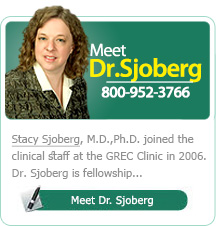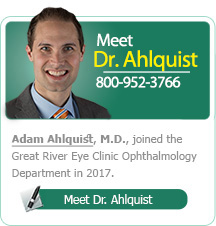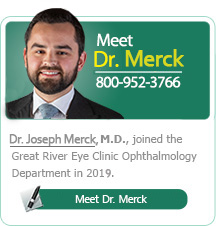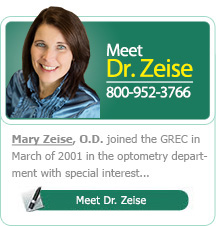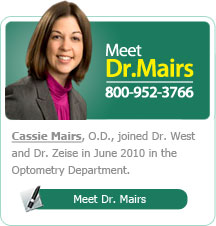Eye Problems
Common eye disorders seen and successfully treated at the Great River Eye Clinic include the following, click on the link to learn more:
Cataracts
Glaucoma
Macular Degeneration
Diabetic Retinopathy
Glaucoma, a leading cause of blindness in the U.S., affects between 3 and 4 million Americans. This includes an estimated 1.5 to 2 million people who do not even know that they have glaucoma. The disease is caused by a build-up of fluid in the eye as a result of it not draining properly. This increase in pressure can damage the optic nerve and cause vision to fade. It most often occurs in people over age 40. If you are African American, have a family history of glaucoma, are very nearsighted or diabetic, you are at higher risk of developing the disease. The most common type of glaucoma develops gradually and painlessly, often without symptoms for a long time.
While glaucoma is not preventable or curable, it can be slowed. The earlier glaucoma is detected, the less damage it can cause and the longer you will have your vision.
Glaucoma Symptoms
- gradual loss of peripheral vision (at the sides of what you see)
- blurred vision
Glaucoma Treatments
![]()
Cataracts
A cataract is a clouding of all or part of the normally clear lens within your eye. More than 20.5 million Americans over age forty are affected with this disease. This clouding results in blurred or distorted vision. Cataracts are usually found in people over age 55, but occasionally younger people can get them.
Cataract Symptoms
- cloudy or blurry vision
- colors that seem faded
- poor night vision
- double or multiple vision (this symptom often goes away as the cataract grows)
- frequent changes in your eyeglasses or contact lenses
Cataract Treatments
A cataract does not need to be removed unless your vision loss interferes with everyday activities, such as driving, reading, or watching TV. You and your eye care professional can make that decision together. When cataracts are small, you can often improve your vision by using different eyeglasses, magnifying lenses, or stronger lighting. If the condition does not improve, surgery to remove the cloudy lens and replace it with a substitute lens is the only effective treatment.
Macular Degeneration
Symptoms
- a gradual loss of the ability to see objects clearly
- distorted vision
- a gradual loss of color vision
- dark or empty areas appearing in the center of vision
Treatments
Successful laser surgery may prevent central vision loss from becoming worse, even though normal vision may not be restored. Another option is prescribed low vision devices such as telescopic and microscopic lenses that make the most out of remaining vision.
Diabetic retinopathy is a complication of diabetes and a leading cause of blindness. It occurs when diabetes damages the tiny blood vessels inside the retina, the light-sensitive tissue at the back of the eye. If you've already been diagnosed with diabetic retinopathy, find out more about treatments and how to protect your vision, call the Great River Eye Clinic for an appointment immediately. If you have already lost some sight from diabetic retinopathy, find out more about of how to make the most of your vision.
Click here for Diabetic Retinopathy pdf
We have only mentioned some of the most common eye diseases. These and others can often be found early by an eye care specialist. That is why the Vision Council of America recommends regular comprehensive eye exams for good eye health.




